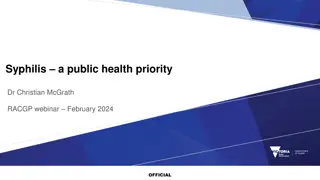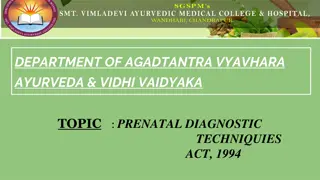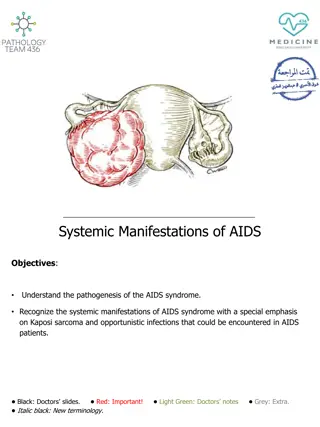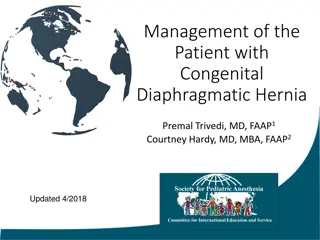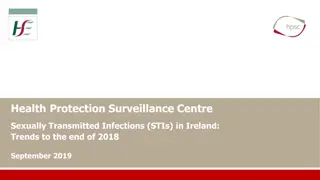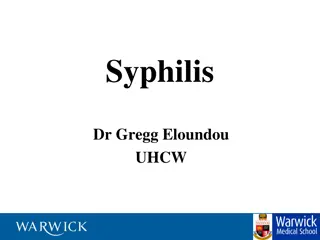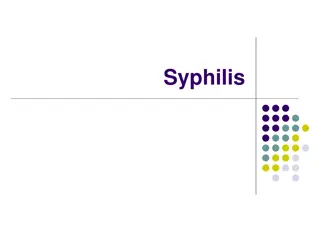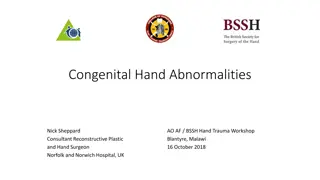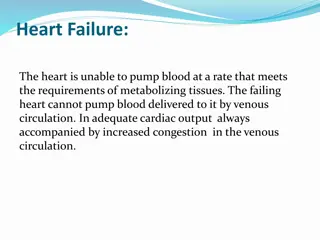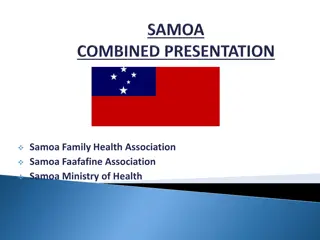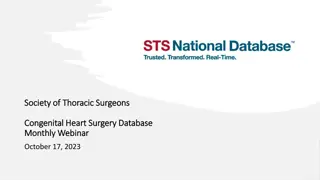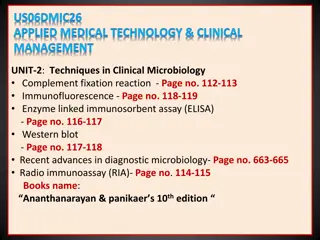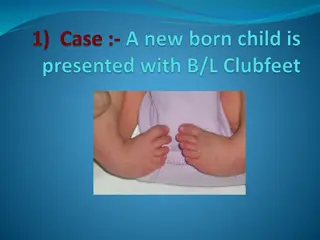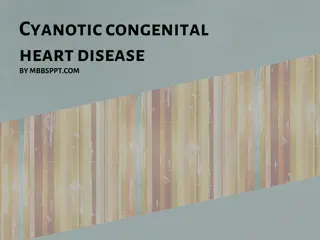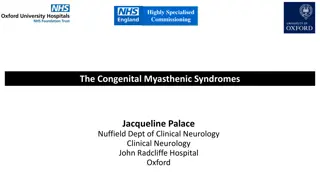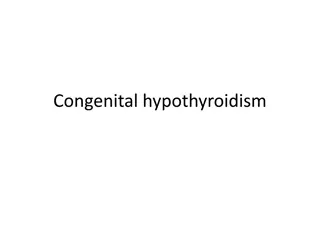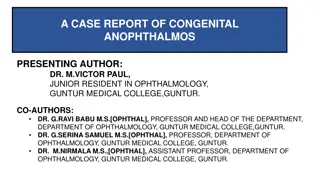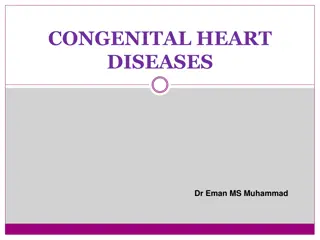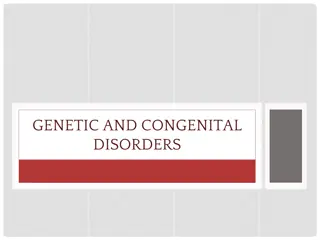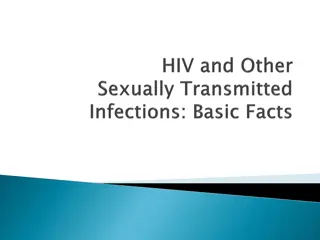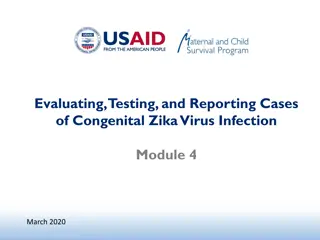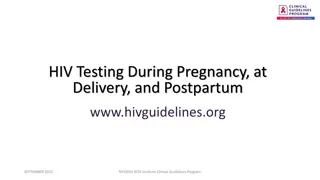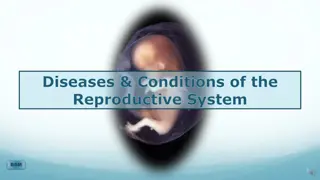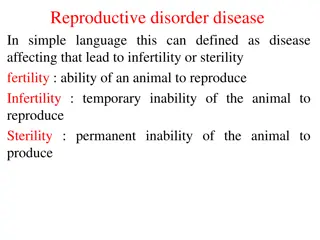Sexually Transmitted Infection (STI) Prevention
Sexually Transmitted Infections (STIs) are infections passed through sexual contact, impacting both men and women. Common STIs include Chlamydia, Gonorrhea, Syphilis, HPV, HIV, Genital Herpes, and Trichomoniasis. Testing is crucial for sexually active individuals, pregnant women, and high-risk group
0 views • 16 slides
Insights on Infant Mortality and Safe Sleep Practices in Illinois
Exploring the definitions of infant mortality and safe sleep practices, this content delves into the Infant Mortality Ratio (IMR) and Sudden Unexpected Infant Death (SUID) Mortality Ratio. Data sources such as vital records and the Pregnancy Risk Assessment Monitoring System (PRAMS) shed light on th
0 views • 57 slides
Addressing Syphilis Resurgence: A Public Health Imperative
Syphilis has reemerged as a critical global public health concern, with alarming rates of new cases reported worldwide. The webinar by Dr. Christian McGrath sheds light on the resurgence of syphilis, its impact on various regions including Australia and Victoria, and outlines key strategies for publ
0 views • 20 slides
Understanding Ventricular Septal Defect (VSD) and Treatment Options
Ventricular Septal Defect (VSD) is a common congenital heart condition characterized by a hole in the septum between the heart's ventricles. This defect can lead to various complications and is often associated with chromosomal disorders. Different types of VSD exist, each requiring tailored treatme
5 views • 72 slides
Newborn Screening Market Share to be Worth $2.69 Billion by 2031
Newborn screening is a screening program for infants under which pre-symptomatic congenital conditions are detected so that treatment can be commenced as soon as possible to prevent or reduce the long-term consequences of the disease. These programs are usually run by the national or state governing
0 views • 3 slides
At-Home HIV/STI Testing Pilot with Simple HealthKit
Communicable Disease Harm Reduction Section collaborated with Simple HealthKit to offer free HIV, syphilis, gonorrhea, chlamydia, and trichomoniasis testing to Wisconsin residents over 18 from August 25, 2023, to October 20, 2023. The aim was to make HIV and STI testing more accessible to those with
0 views • 23 slides
Understanding the Prenatal Diagnostics Techniques Act of 1994 in India
The Prenatal Diagnostic Techniques Act of 1994 in India aims to curb female foeticide and address the dwindling sex ratio by prohibiting prenatal sex determination. This legislation regulates diagnostic methods, prevents sex selection, and focuses on detecting genetic disorders, metabolic abnormalit
0 views • 15 slides
Understanding Systemic Manifestations of AIDS
Human Immunodeficiency Virus (HIV) is a retrovirus causing Acquired Immunodeficiency Syndrome (AIDS). HIV leads to immune system destruction, making individuals vulnerable to opportunistic infections and tumors. Common sexually transmitted diseases like syphilis, chlamydia, and gonorrhea are discuss
6 views • 15 slides
Comprehensive Management of Congenital Diaphragmatic Hernia
This presentation covers the pathophysiology, associated anomalies, diagnosis, consequences, and management of congenital diaphragmatic hernia (CDH). It discusses prenatal interventions, postnatal strategies, anesthetic considerations, and long-term concerns in CDH repair. Understanding the complexi
1 views • 26 slides
Medical Apartheid: The Dark History of Medical Experimentation on Black Americans
Blacks in America have suffered from a dark history of medical abuse and exploitation, from being used as guinea pigs in colonial times to being subjects of unethical experiments like the Tuskegee Syphilis Study. Harriet A. Washington's book "Medical Apartheid" exposes the systemic racism and mistre
0 views • 7 slides
Understanding the Impact of Congenital Syphilis in Indiana
Social Vulnerability in Congenital Syphilis cases among mothers in Indiana is a pressing issue. Despite being preventable, the rise in cases signals a failure in detection and care systems. The trend of increasing cases is associated with a rise in infectious syphilis among women. This qualitative a
6 views • 36 slides
STIs in Ireland: Trends and Key Findings up to 2018
The Health Protection Surveillance Centre in Ireland reported an increasing trend in sexually transmitted infections (STIs) in 2018. The notification rate per 100,000 population showed rises in various STIs, with particular prevalence among young people aged 15-24 years. Chlamydia, herpes simplex, a
0 views • 21 slides
Understanding Syphilis: Clinical Stages, Diagnosis, and Management
Syphilis, a sexually transmitted infection, presents various clinical stages from primary to late latent. Diagnosed through serological tests like VDRL and FTA, primary syphilis shows painless ulcers, while secondary syphilis exhibits systemic vasculitis with a characteristic rash. Management involv
0 views • 22 slides
Biomedical Recommendations for Doxycycline Post-Exposure Prophylaxis
This clinical guideline discusses the use of doxycycline post-exposure prophylaxis (PEP) to prevent bacterial sexually transmitted infections (STIs) such as syphilis, chlamydia, and gonorrhea. It provides evidence-based recommendations for offering doxy-PEP to individuals engaging in condomless sex
0 views • 10 slides
Understanding Choledochal Cysts: A Congenital Anomaly of the Biliary Tract
Choledochal cysts are congenital anomalies of the biliary tract characterized by cystic dilatation at various segments. They can lead to complications like biliary cirrhosis and recurrent pancreatitis. Clinical features include jaundice, abdominal pain, and right epigastric mass. Early detection is
0 views • 22 slides
Understanding Syphilis: Causes, Symptoms, and Treatment
Syphilis is a sexually transmitted infection caused by Treponema pallidum. This spirochete bacteria can lead to various stages of syphilis, including primary, secondary, and tertiary. The infection is primarily acquired through sexual contact but can also be transmitted non-venereally. Recognizing t
0 views • 16 slides
Understanding Congenital Hand Abnormalities and Associated Syndromes
Explore congenital hand abnormalities such as macrodactyly, trigger thumb, clasped thumb, preaxial deficiency, and syndromes like Holt-Oram Syndrome and Fanconi Anemia. Learn about assessment, intervention plans, and common treatments provided by experts in reconstructive plastic and hand surgery.
1 views • 26 slides
Understanding Heart Failure and Congenital Heart Diseases
Heart failure is a condition where the heart struggles to pump blood efficiently, leading to various complications. It can affect different sides of the heart, with causes ranging from coronary artery disease to valve problems. Congenital heart diseases, on the other hand, are common anomalies prese
0 views • 19 slides
Update on Health Statistics in Samoa
The health statistics in Samoa reveal challenges and progress in managing HIV, syphilis, and tuberculosis cases. As of 2021, there are 13 people living with HIV in Samoa, with an increase in syphilis cases compared to the previous year. The country has seen no patients with multi-drug-resistant tube
0 views • 20 slides
Benefits and Risks of Exercise in Congenital Heart Disease
Exploring the definitions of congenital heart disease and exercise, this content delves into the benefits and risks associated with physical activity for individuals with CHD. It highlights the importance of different types of exercise, from dynamic to static, and explains the distinctions between m
0 views • 33 slides
Understanding Chlamydia and Syphilis: Common STDs to Know
Chlamydia and syphilis are common sexually transmitted infections that can have serious health consequences if left untreated. Chlamydia is often asymptomatic but can lead to complications like pelvic inflammatory disease in women. Syphilis presents with painless sores and can progress to affect the
0 views • 20 slides
Congenital Heart Surgery Database Training and Updates - October 17, 2023
In the upcoming event on October 17, 2023, the Society of Thoracic Surgeons will host a webinar focusing on the Congenital Heart Surgery Database along with essential updates and education for STS data managers. The session will cover a wide range of topics such as case inclusion requirements, data
0 views • 54 slides
Clinical Microbiology Techniques: Complement Fixation Test (CFT) in Diagnostic Practice
Complement Fixation Test (CFT) is a key technique in clinical microbiology, utilizing antigen-antibody complexes to fix complement for various immunological reactions. The test involves multiple steps and reagents, with guinea pig serum for complement activation. Standardization is crucial for accur
0 views • 46 slides
Club Foot (Congenital Talipes Equinovarus): A Comprehensive Overview
Club foot, also known as Congenital Talipes Equinovarus, is a condition characterized by a tri-planar deformity of the foot. This article covers the aetiology, clinical features, diagnosis, treatment options, and patient management strategies for club foot. It discusses the gene variations, environm
0 views • 26 slides
Causes and features of cyanotic congenital heart disease
This informative content covers the causes and features of cyanotic congenital heart disease, including central cyanosis due to congenital heart diseases like Tetralogy of Fallot, pulmonary atresia, Ebstein anomaly, and more. It also discusses non-cardiac causes of cyanosis related to lung diseases,
0 views • 41 slides
Understanding Birth Defects: An Overview of Congenital Anomalies
Birth defects refer to abnormalities present in babies at birth, regardless of genetic or prenatal causes. They affect 2-3% of babies in the US, making them a leading cause of infant mortality. Structural defects like cleft lip/palate, spina bifida, and club foot can impact a child's health and deve
0 views • 17 slides
Specialised Commissioning for Congenital Myasthenic Syndromes - Overview by Professor Jacqueline Palace
Delve into the highly specialised commissioning of Congenital Myasthenic Syndromes by Professor Jacqueline Palace from the Nuffield Department of Clinical Neurology at John Radcliffe Hospital, Oxford. Explore key messages, learning objectives, and disclosures related to diagnosing, differentiating,
0 views • 4 slides
Evolution of Victorian Attitudes Towards Sexuality and Gender Identity
Explore the evolution of Victorian attitudes towards sexuality, gender identity, and sexual behaviors. From fears of masturbation and syphilis to the control of male urges and female sexual behavior, delve into the societal shifts, medical beliefs, and moral values that shaped perceptions during the
0 views • 20 slides
Optimal Management Strategies for Congenital Hypothyroidism
Congenital hypothyroidism requires early diagnosis and prompt treatment initiation for optimal outcomes. Factors influencing treatment success include the age of starting treatment, severity of hypothyroidism, starting dose of medication, and ongoing monitoring of thyroid levels. Studies suggest tha
0 views • 11 slides
Case Report of Congenital Anophthalmos in a Newborn
The case report discusses a 5-day-old newborn with congenital anophthalmos, a rare condition characterized by the absence of the eye globe since birth. The patient presented with a deformed right eye and examination revealed a complete absence of ocular tissue in the right eye socket along with norm
0 views • 6 slides
Overview of Congenital Heart Diseases
Congenital heart diseases are abnormalities in the heart's structure present at birth. Factors like viral infections, genetic conditions, and maternal health contribute to these conditions. There are non-cyanotic and cyanotic classifications based on shunting patterns. Examples include atrial septal
0 views • 36 slides
Overview of Genetic and Congenital Disorders and Their Causes
Explore the terminology, causes, characteristics, and results of genetic and congenital disorders, as well as the disorders of single-gene inheritance. Learn about autosomal dominant disorders like Marfan Syndrome and Neurofibromatosis. Discover how single-gene disorders are inherited and their impa
0 views • 24 slides
Understanding STIs and HIV/AIDS Among American Indian Women
Learn about various sexually transmitted infections (STIs), how they are contracted, and the importance of protection and testing. Understand the impact of STIs on American Indian women locally and nationally, including HIV, Herpes, HPV, Chlamydia, Gonorrhea, and Syphilis. Explore the progression fr
0 views • 26 slides
Understanding Congenital Zika Virus Infection Evaluation and Reporting
This module provides comprehensive information on evaluating, testing, and reporting cases of congenital Zika virus infection. Learners will gain insights into guidelines, case definitions, and the importance of accurate reporting for better surveillance. Access to updated resources and the impact o
0 views • 34 slides
History of Psychological Disorders and Treatment Methods
The chapter delves into the terms and history of psychological disorders, covering aspects like prevalence, incidence, sex ratio, age of onset, prognosis, etiology, and early beliefs surrounding mental illness. It explores the influence of figures such as Hippocrates and Galen, as well as advancemen
0 views • 15 slides
Guidelines for HIV Testing During Pregnancy and Postpartum
These guidelines recommend HIV testing during pregnancy, at delivery, and postpartum. Testing should be done early in pregnancy and again in the third trimester. Expedited testing during labor is required for certain patients, and syphilis testing is recommended. Pre-exposure and post-exposure proph
0 views • 18 slides
HIV and STI Data Overview in Urban Areas (December 2018)
This data report, updated in December 2018, provides insights into HIV and STI prevalence, viral load suppression, achievement of 90-90-90 goals, and hepatitis B and syphilis seroprevalence among HIV-positive adults in urban areas. The figures and maps illustrate statistics based on the EPHIA 2018 s
0 views • 9 slides
Reproductive System Diseases and Conditions Overview
This comprehensive overview covers various diseases and conditions of the reproductive system, ranging from sexually transmitted infections like syphilis and gonorrhea to reproductive issues like ovarian cysts and infertility. It also discusses conditions such as pre-eclampsia and menopause. The inf
0 views • 7 slides
Overview of Cyanotic Congenital Heart Diseases (CCHD)
This content provides detailed information and images on various types of Cyanotic Congenital Heart Diseases (CCHD) including CCHD with low PBF, CCHD with high PBF, TOF equivalents, Eisenmenger syndrome, inter-circulatory mixing, and more. It explores causes of cyanosis, classifications based on phy
0 views • 16 slides
Reproductive disorder disease
Reproductive disorders in animals can lead to infertility or sterility, affecting their ability to reproduce. Causes include congenital, hormonal, nutritional, infectious, and management factors. Congenital or hereditary causes may involve conditions like hermaphroditism, freemartin syndrome, and ov
0 views • 20 slides


